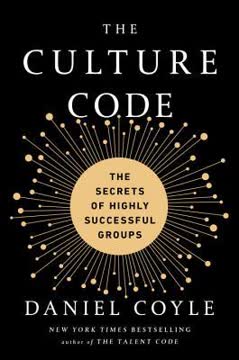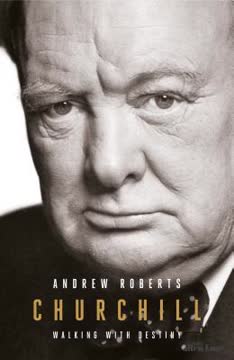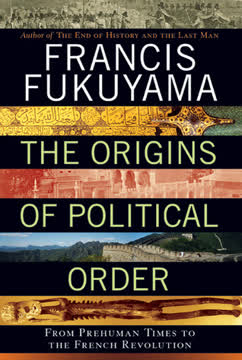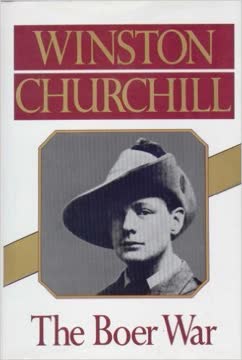Key Takeaways
1. Churchill's Early Life: Resilience and Determination Forged in Adversity
"I have nothing to offer but blood, toil, tears and sweat."
Early struggles shaped Churchill's character. Born into privilege but facing personal challenges, young Winston Churchill developed resilience and determination that would serve him throughout his life. His time at Harrow School and the Royal Military College at Sandhurst honed his skills and ambition.
Military experiences forged leadership. Churchill's early military career, including service in Cuba, India, and South Africa, provided valuable experiences and insights. His dramatic escape from a Boer prison camp in 1899 catapulted him to fame and launched his political career.
Political ascent marked by controversy. Entering Parliament in 1900, Churchill's political journey was marked by both triumphs and setbacks. His controversial decisions as First Lord of the Admiralty during World War I, particularly the failed Gallipoli campaign, led to his temporary political exile, a period he called his "wilderness years."
2. The Rise of Nazi Germany: Churchill's Prescient Warnings and Calls to Action
"I have watched this famous island descending incontinently, fecklessly, the stairway which leads to a dark gulf."
Churchill recognized the Nazi threat early. While many in Britain and Europe hoped for peace and advocated appeasement, Churchill consistently warned about the dangers posed by Adolf Hitler and Nazi Germany. His speeches in Parliament and writings during the 1930s urged rearmament and a stronger stance against German aggression.
Warnings often fell on deaf ears. Despite Churchill's impassioned pleas, many British politicians and citizens, weary from World War I, were reluctant to confront Germany. Key events that Churchill highlighted as dangerous:
- German rearmament in violation of the Treaty of Versailles
- The remilitarization of the Rhineland in 1936
- The annexation of Austria in 1938
- The Munich Agreement and the surrender of the Sudetenland in 1938
Vindication came at a high cost. As Churchill's predictions about Nazi aggression proved accurate, his political standing grew. However, the failure to heed his warnings meant that Britain and its allies were ill-prepared when war finally came in 1939.
3. World War II Begins: Churchill's Leadership in Britain's Darkest Hour
"I felt as if I were walking with destiny, and that all my past life had been but a preparation for this hour and for this trial."
Churchill becomes Prime Minister. On May 10, 1940, as German forces invaded France and the Low Countries, Winston Churchill was appointed Prime Minister of the United Kingdom. His leadership would prove crucial in rallying the nation and guiding Britain through its darkest hours.
Faced immediate crises. Churchill's government confronted a series of critical challenges:
- The fall of France and the evacuation of British forces from Dunkirk
- The threat of German invasion
- The start of the Blitz, German bombing raids on British cities
Refusal to negotiate with Hitler. Despite pressure from some quarters to seek a negotiated peace with Germany, Churchill was adamant that Britain would fight on. His resolve helped steel the nation for the long and difficult struggle ahead.
4. The Battle of Britain: Courage and Resilience in the Face of German Aggression
"Never in the field of human conflict was so much owed by so many to so few."
Britain stands alone. Following the fall of France in June 1940, Britain faced the might of Nazi Germany alone. The Royal Air Force's defense against the Luftwaffe's attempts to gain air superiority over southern England became known as the Battle of Britain.
Churchill rallied the nation. Through his speeches and radio broadcasts, Churchill inspired the British people to persevere through the German onslaught. He visited bomb-damaged cities, boosting morale and emphasizing the importance of civilian resilience.
Victory in the air. The RAF's successful defense against the Luftwaffe marked a turning point in the war. Key factors in Britain's success:
- The bravery and skill of RAF pilots
- The effective use of radar and coordinated air defense systems
- The strategic decision to target German bomber formations rather than fighting individual dogfights
5. Churchill's Oratory: Inspiring a Nation and Rallying the Free World
"We shall fight on the beaches, we shall fight on the landing grounds, we shall fight in the fields and in the streets, we shall fight in the hills; we shall never surrender."
Mastery of language and delivery. Churchill's speeches during World War II are considered some of the greatest examples of political oratory in history. His ability to craft powerful, memorable phrases and deliver them with conviction helped galvanize British resolve.
Speeches as weapons of war. Churchill understood the power of words to shape public opinion and maintain morale. His most famous speeches, including "Blood, Toil, Tears and Sweat" and "We Shall Fight on the Beaches," became rallying cries for the British people and inspired resistance to Nazi tyranny around the world.
Reaching beyond Britain. Churchill's oratory also played a crucial role in building international support for the Allied cause, particularly in the United States. His ability to articulate the stakes of the conflict in moral terms helped persuade many Americans that supporting Britain was essential to defending democracy worldwide.
6. Strategic Decisions: Difficult Choices in the Pursuit of Victory
"In war, resolution; in defeat, defiance; in victory, magnanimity."
Balancing military and political considerations. As both Prime Minister and Minister of Defence, Churchill was involved in virtually every major strategic decision of the war. He had to balance military necessities with political realities, often making difficult choices.
Controversial decisions. Some of Churchill's most contentious wartime decisions included:
- The sinking of the French fleet at Mers-el-Kébir to prevent it from falling into German hands
- The strategic bombing campaign against German cities
- The decision not to divert resources to relieve the Bengal famine in India
Long-term vision. Despite setbacks and criticisms, Churchill maintained a focus on the ultimate goal of defeating Nazi Germany and its allies. His strategic vision helped guide the Allies through the darkest periods of the war toward eventual victory.
7. Allied Cooperation: Forging Partnerships to Defeat Tyranny
"If we are together nothing is impossible. If we are divided all will fail."
Building the Grand Alliance. Churchill recognized early on that Britain could not defeat Nazi Germany alone. He worked tirelessly to build and maintain the Allied coalition, particularly focusing on bringing the United States into the war.
Personal diplomacy. Churchill's relationships with other Allied leaders, especially U.S. President Franklin D. Roosevelt and Soviet leader Joseph Stalin, were crucial to maintaining Allied unity. Key meetings included:
- The Atlantic Conference with Roosevelt in 1941
- The Tehran Conference with Roosevelt and Stalin in 1943
- The Yalta Conference in 1945
Balancing competing interests. As the war progressed, Churchill had to navigate the often conflicting goals and strategies of the Allied powers. He worked to ensure that Britain's interests were protected while maintaining the unity necessary to defeat the Axis powers.
8. The Path to Victory: Perseverance Through Setbacks and Challenges
"Success is not final, failure is not fatal: it is the courage to continue that counts."
Maintaining resolve through difficult times. The road to Allied victory was long and fraught with setbacks. Churchill's leadership was crucial in maintaining British and Allied determination through defeats in North Africa, setbacks in the Battle of the Atlantic, and the slow progress of the war in Europe.
Key turning points. Churchill helped guide the Allies through critical moments that eventually led to victory:
- The entry of the United States into the war after Pearl Harbor
- The Battle of El Alamein and the North African campaign
- The D-Day invasion of Normandy
Personal involvement in strategy. Churchill took an active role in military planning, sometimes to the frustration of his generals. His strategic insights, combined with his ability to inspire and lead, were essential in keeping the Allies focused on the ultimate goal of unconditional surrender by the Axis powers.
9. Churchill's Legacy: Shaping the Post-War World and Defending Freedom
"Never give up on something that you can't go a day without thinking about."
Architect of victory, but voted out of office. Despite leading Britain to victory in World War II, Churchill and the Conservative Party were defeated in the 1945 general election. The British public, while grateful for his wartime leadership, sought a different direction for post-war reconstruction.
Warning about the Iron Curtain. In his famous "Sinews of Peace" speech at Fulton, Missouri in 1946, Churchill warned about the growing threat of Soviet expansionism and the division of Europe. This speech is often seen as marking the beginning of the Cold War era.
Continuing influence. Churchill returned as Prime Minister from 1951 to 1955, but his most significant post-war contributions were as an elder statesman and historian. His six-volume history of World War II and other writings helped shape the understanding of the conflict and its aftermath.
Enduring symbol of resistance to tyranny. Churchill's unwavering stance against totalitarianism, both fascist and communist, made him a powerful symbol of democratic values and the importance of standing up to aggression. His legacy continues to inspire leaders and citizens around the world in the ongoing struggle for freedom and democracy.
Last updated:
Review Summary
Churchill: The Power of Words is highly praised for its compelling selection of Churchill's speeches and writings. Readers appreciate the chronological arrangement, Gilbert's insightful introductions, and the book's ability to showcase Churchill's masterful command of language. Many find it inspiring and educational, offering a unique perspective on historical events. Some note the omission of controversial topics, while others highlight Churchill's visionary leadership and eloquence. Overall, reviewers recommend it for those interested in Churchill, British history, and powerful rhetoric.
Similar Books










Download PDF
Download EPUB
.epub digital book format is ideal for reading ebooks on phones, tablets, and e-readers.





